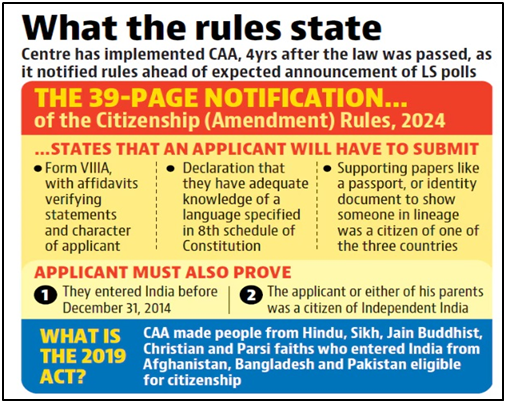Why in news?
- The Ministry of Home Affairs (MHA) has notified the Citizenship Amendment Rules, 2024 that would enable the implementation of the Citizenship Amendment Act (CAA).
- The Act was passed on December 11, 2019, receiving assent from the President on December 12 the same year.
- The MHA had earlier notified that the Act will come into force from January 10, 2020. Since the rules were not framed yet, the Act could not be implemented.
What’s in today’s article?
- Citizenship Amendment Act (CAA)
- Citizenship Amendment Rules, 2024
The Citizenship (Amendment) Act (CAA) 2019:
- About:
- It seeks to amend the definition of illegal immigrant for Hindu, Sikh, Parsi, Buddhist, Jains and Christian (but not Muslim) immigrants from Pakistan, Afghanistan and Bangladesh, who have lived in India without documentation.
- They will be granted fast track Indian citizenship in 5 years (11 years earlier).
- The Act (which amends the Citizenship Act 1955) also provides for cancellation of Overseas Citizen of India (OCI) registration where the OCI card-holder has violated any provision of the Citizenship Act or any other law in force.
- Who is eligible?
- The CAA 2019 applies to those who were forced or compelled to seek shelter in India due to persecution on the ground of religion. It aims to protect such people from proceedings of illegal migration.
- The cut-off date for citizenship is December 31, 2014, which means the applicant should have entered India on or before that date.
- The act will not apply to areas covered by the Constitution's sixth schedule, which deals with autonomous tribal-dominated regions in Assam, Meghalaya, Tripura, and Mizoram.
- Additionally, the act will not apply to states that have an inner-line permit regime (Arunachal Pradesh, Nagaland and Mizoram).
- Delay in notification of CAA rules
- One of the prime reasons is the vociferous opposition faced by the CAA in several states including Assam and Tripura.
- The protests in Assam were fuelled by fears that the legislation would permanently alter the demographics of the state.
- CAA is seen in Assam as a violation of the 1985 Assam Accord which allows foreign migrants who came to Assam after January 1, 1966 but before March 25, 1971 to seek citizenship.
- Cut-off date for citizenship under the CAA is December 31, 2014.
- The protests didn’t remain confined to the North-East, but spread to other parts of the country.
- Multiple petitions are before the Supreme Court, challenging the constitutional validity of the CAA.
- The petitioners have contended that the law is anti-Muslim, violating Article 14 (Right to Equality) of the Indian Constitution.
- It is arbitrary as it leaves out the persecuted Rohingya of Myanmar, Tibetan Buddhists from China and Tamils from Sri Lanka.
Citizenship Amendment Rules, 2024

- The process
- Eligible refugees seeking citizenship through registration or naturalization must submit an application along with an affidavit confirming the accuracy of the statements made in it.
- Additionally, they need an affidavit from an Indian citizen vouching for their character and a declaration stating their familiarity with one of the languages listed in the eighth schedule to the Constitution of India.
- E-application to the district-level committee
- The rules require the application to be submitted electronically to an empowered committee via the district-level committee, as notified by the central government.
- Once the application is submitted, the district-level committee, headed by a designated officer, will verify the documents.
- It will also administer the oath of allegiance to the applicant.
- If an applicant doesn't show up in person to sign the application and take the oath of allegiance, despite being given chances, the district-level committee will send the application to the empowered committee to consider rejecting it.
- Supporting documents
- Applicants must provide supporting documents such as:
- passport issued by the governments of Pakistan, Afghanistan, or Bangladesh,
- a birth certificate,
- any form of identity document, land or tenancy records, or
- any document proving that the applicant's parents, grandparents, or great-grandparents were citizens of one of the three countries.
- These documents remain valid even beyond their expiration dates.
- Until now, these migrants were either living in India illegally or on long-term visas.
- Verification of entry date
- Applicants also have to provide proof that they entered India before December 31, 2014.
- 20 supporting document for this can be of:
- either a visa and immigration stamp, registration certificate from the Foreigners Regional Registration Officer (FRRO),
- or slip issued by the Census enumerators in India, government-issued licence or certificate
- permit in India (including driving license, Aadhaar number, ration card),
- marriage certificate issued in India etc.
- Digital certificate
- Once an application is approved, the applicants will be issued a digital certificate.
New rule has changed the producers to grant citizenship
- Earlier, citizenship applications were made to the district collector, who is under the administrative control of the state government.
- The new rules provide for an empowered committee and a district level committee to be instituted by the Centre for receiving and processing the applications.
- These applications are to be submitted electronically.
- The empowered committee would be headed by a director (census operations).
- Other members include:
- deputy secretary or above officer of the Subsidiary Intelligence Bureau, the FRRO,
- state informatics officer of the National Informatics Centre,
- postmaster general of the state.
- There would also be two invitees to the committee:
- a representative from the office of principal secretary (home) or additional chief secretary (home) of the state government or UT concerned; and
- a representative of the Railways’ jurisdictional divisional railway manager.










